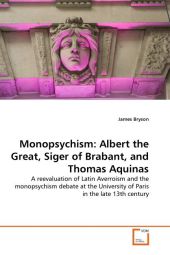 Neuerscheinungen 2010Stand: 2020-01-07 |
Schnellsuche
ISBN/Stichwort/Autor
|
Herderstraße 10
10625 Berlin
Tel.: 030 315 714 16
Fax 030 315 714 14
info@buchspektrum.de |

James Bryson
Monopsychism: Albert the Great, Siger of Brabant, and Thomas Aquinas
A reevaluation of Latin Averroism and the monopsychism debate at the University of Paris in the late 13th century
2010. 136 S. 220 mm
Verlag/Jahr: VDM VERLAG DR. MÜLLER 2010
ISBN: 3-639-06305-8 (3639063058)
Neue ISBN: 978-3-639-06305-9 (9783639063059)
Preis und Lieferzeit: Bitte klicken
A doctrine widely considered to jeopardize Christian belief in the immortality of the soul, monopsychism aroused members of the theology and arts faculties at the University of Paris into intense debate about the nature of man. Born out of the philosophical legacy of Greek Antiquity, late antique Neoplatonic philosophy, and medieval Arabic commentary, Christian theologians and philosophers were forced to confront their own intellectual past in relation to pressing contemporary questions. The Unity of the Intellect for Albert the Great, Siger of Brabant, and Thomas Aquinas revisits this debate in light of divided 20th century scholarship. Bryson identifies Albert the Great, Siger of Brabant, and Thomas Aquinas as principal figures. Through careful analysis of their relevant treatises, he illumines much about the character of philosophical commentary, epistemology, and psychology in the Middle Ages, and what this period owes to its forbearers. Bryson claims to have resolved questions about the debate´s origins in the phenomenon of Latin Averroism´. Special attention to Aquinas´ epistemology, against the Averroistic psychological model, lies at the heart of the argument.
James Bryson is pursuing PhD at Cambridge under the supervision of Douglas Hedley on Thomas Jackson´s Neoplatonism. This present work depends on research done for an MA thesis in the Classics Department at Dalhousie University supervised by Wayne Hankey. Bryson holds a BA from the University of King´s College in Classics and Early Modern Studies.


